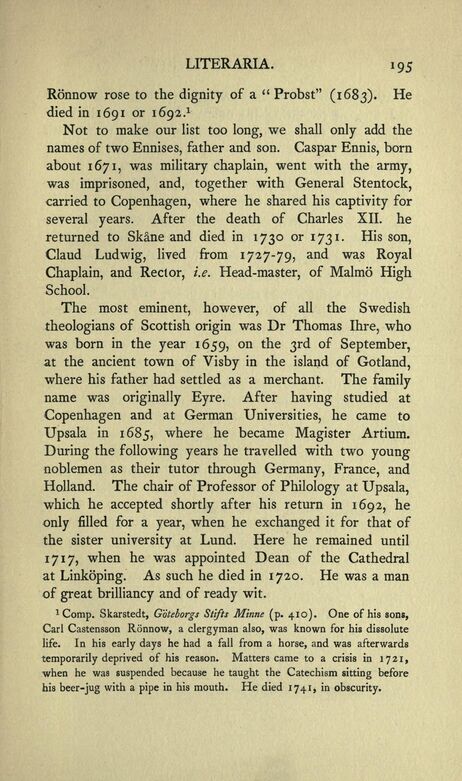
Full resolution (JPEG) - On this page / på denna sida - Sidor ...

<< prev. page << föreg. sida << >> nästa sida >> next page >>
Below is the raw OCR text
from the above scanned image.
Do you see an error? Proofread the page now!
Här nedan syns maskintolkade texten från faksimilbilden ovan.
Ser du något fel? Korrekturläs sidan nu!
This page has never been proofread. / Denna sida har aldrig korrekturlästs.
Rönnow rose to the dignity of a “ Probst” (1683). He
died in 1691 or 1692.1
Not to make our list too long, we shall only add the
names of two Ennises, father and son. Caspar Ennis, born
about 1671, was military chaplain, went with the army,
was imprisoned, and, together with General Stentock,
carried to Copenhagen, where he shared his captivity for
several years. After the death of Charles XII. he
returned to Skåne and died in 1730 or 1731. His son,
Claud Ludwig, lived from 1727-79, and was Royal
Chaplain, and Rector, i.e. Head-master, of Malmö High
School.
The most eminent, however, of all the Swedish
theologians of Scottish origin was Dr Thomas Ihre, who
was born in the year 1659, 011 t^le 3fd °f September,
at the ancient town of Visby in the island of Gotland,
where his father had settled as a merchant. The family
name was originally Eyre. After having studied at
Copenhagen and at German Universities, he came to
Upsala in 1685, where he became Magister Artium.
During the following years he travelled with two young
noblemen as their tutor through Germany, France, and
Holland. The chair of Professor of Philology at Upsala,
which he accepted shortly after his return in 1692, he
only filled for a year, when he exchanged it for that of
the sister university at Lund. Here he remained until
1717, when he was appointed Dean of the Cathedral
at Linköping. As such he died in 1720. He was a man
of great brilliancy and of ready wit.
1 Comp. Skarstedt, Göteborgs Stifts Minne (p. 410). One of his sons,
Carl Castensson Rönnow, a clergyman also, was known for his dissolute
life. In his early days he had a fall from a horse, and was afterwards
temporarily deprived of his reason. Matters came to a crisis in 1721,
when he was suspended because he taught the Catechism sitting before
his beer-jug with a pipe in his mouth. He died 1741, in obscurity.
<< prev. page << föreg. sida << >> nästa sida >> next page >>